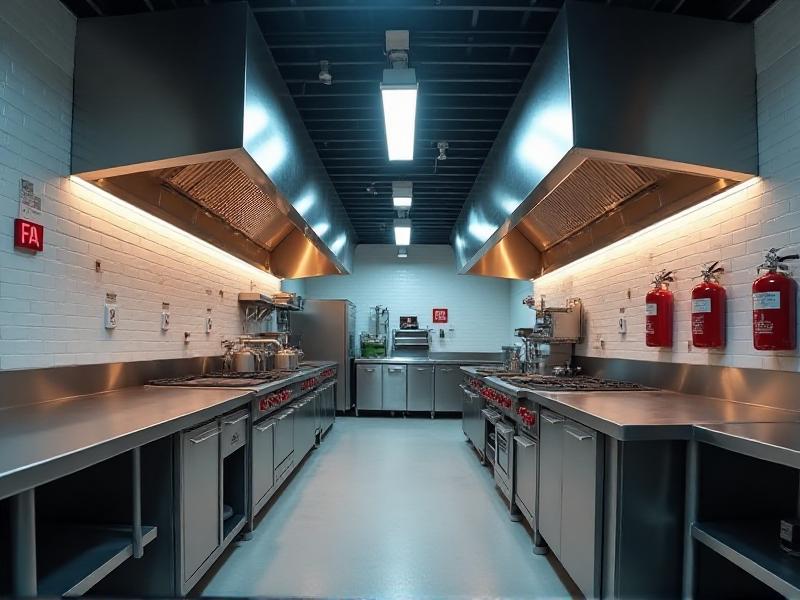Commercial Kitchen Rental Compliance
Understanding Commercial Kitchen Rental Compliance
When renting a commercial kitchen, compliance with local, state, and federal regulations is paramount. These rules ensure that the kitchen operates safely, maintains hygiene standards, and meets legal requirements. Failure to comply can result in fines, closures, or even legal action. This section will explore the foundational aspects of commercial kitchen rental compliance, including zoning laws, health codes, and fire safety regulations. Understanding these basics is the first step toward ensuring a smooth and lawful operation.

Health and Safety Regulations in Commercial Kitchens
Health and safety are the cornerstones of any commercial kitchen. This section delves into the specific regulations that govern food handling, storage, and preparation. Topics include proper sanitation practices, pest control measures, and employee hygiene protocols. Additionally, we’ll discuss the importance of regular inspections and how to prepare for them. By adhering to these guidelines, kitchen operators can ensure a safe environment for both staff and customers, while avoiding costly violations.

Fire Safety and Emergency Preparedness
Fire safety is a critical aspect of commercial kitchen compliance. This section covers the essential fire prevention measures, such as installing fire suppression systems, maintaining clear exit routes, and conducting regular fire drills. We’ll also explore the role of fire safety inspections and the importance of having emergency plans in place. By prioritizing fire safety, kitchen operators can protect their property, employees, and customers from potential hazards.

Licensing and Permits for Commercial Kitchens
Operating a commercial kitchen requires obtaining the necessary licenses and permits. This section outlines the various permits needed, such as food service licenses, alcohol permits, and business operation licenses. We’ll also discuss the application process, renewal requirements, and the consequences of operating without proper documentation. Ensuring that all licenses and permits are up-to-date is crucial for maintaining compliance and avoiding legal issues.
Employee Training and Compliance
Employees play a vital role in maintaining compliance in a commercial kitchen. This section emphasizes the importance of comprehensive training programs that cover food safety, hygiene, and emergency procedures. We’ll also discuss the benefits of ongoing education and how to keep staff updated on the latest regulations. By investing in employee training, kitchen operators can foster a culture of compliance and ensure that their team is well-equipped to meet regulatory standards.
Navigating Zoning and Building Codes
Zoning and building codes are often overlooked but are essential components of commercial kitchen compliance. This section explains how to navigate these regulations, including understanding zoning laws, obtaining building permits, and ensuring that the kitchen’s layout meets code requirements. We’ll also discuss the role of local authorities and how to work with them to ensure compliance. Properly addressing zoning and building codes can prevent costly renovations and legal disputes.
Environmental Compliance in Commercial Kitchens
Environmental regulations are becoming increasingly important in the operation of commercial kitchens. This section explores topics such as waste management, energy efficiency, and water conservation. We’ll also discuss the benefits of adopting sustainable practices and how they can contribute to compliance and cost savings. By prioritizing environmental compliance, kitchen operators can reduce their ecological footprint and enhance their reputation.
Record-Keeping and Documentation
Maintaining accurate records is a crucial aspect of commercial kitchen compliance. This section covers the types of documentation required, such as inspection reports, employee training records, and maintenance logs. We’ll also discuss best practices for organizing and storing these records to ensure they are easily accessible during inspections. Proper record-keeping not only helps demonstrate compliance but also provides valuable insights for improving kitchen operations.
Staying Updated on Regulatory Changes
Regulations governing commercial kitchens are subject to change, and staying informed is essential. This section provides tips on how to keep up with regulatory updates, such as subscribing to industry newsletters, attending workshops, and consulting with legal experts. We’ll also discuss the importance of proactive compliance and how to adapt to new requirements. Staying updated ensures that your kitchen remains compliant and avoids potential penalties.
Conclusion: The Importance of Compliance in Commercial Kitchen Rentals
Compliance is not just a legal obligation; it’s a commitment to safety, quality, and professionalism. By understanding and adhering to the various regulations governing commercial kitchens, operators can create a safe and efficient environment for their staff and customers. This article has explored the key aspects of compliance, from health and safety to environmental regulations, and provided practical tips for maintaining it. Remember, compliance is an ongoing process that requires vigilance, education, and a proactive approach.






